Newsletter May 2021 / IFLA’s Libraries for Children & Young Adults Section / all articles
This document lists all articles in a single document. Pictures to the articles are not always included in this compilation.
Latest News: Short Report on the Safer Internet Day Survey
The Safer Internet Day working group launched its survey in Spring 2021 and collected 482 responses from librarians serving young people around the world. Many thanks to all who participated.
Data analysis is underway! So far, we’ve seen lots of interesting data about what sorts of digital services libraries are providing to young people—from Internet access to hand-held gaming devices, and about how youth services librarians are managing Internet safety—or not. While many librarians participate in community skills-building around safe practices, others were either not aware of Safer Internet Day, or struggle to raise awareness about Internet safety in their communities. We hope the survey will allow those of us in the Section on Libraries for Children and Young Adults to learn more about how we can help. Look for dissemination of survey results soon!
Safer Internet Day working group 2021: Marianne Martens, coordinator, (USA), Razina Akhter (Bangladesh), Maria Alekseeva (Russia), Annie Everall (UK), Emiko Goeku (Japan), Huey Bin Heng (Singapore), Alica Kolaric (Croatia), Antonella Lamberti (Italy), Naoko Nakajima (Japan), Carolynn Rankin (UK), Melanie Ramirez (Phillipines)
Going Digital: Bringing the Library to Teens in the New Normal
By Ms Siti Aisyah Binte Abdul Nasir, Deputy Head (Children & Teens) | Programmes and Exhibitions, Archives and Libraries Group, National Library Board, Singapore
In Singapore, the National Library Board (NLB) runs 27 public libraries, with teens making up about 10% of our patrons. When the COVID-19 pandemic came to our shores, Singapore entered the Circuit Breaker period from 7 April to 1 Jun 2020. With the temporary closure of public libraries to stem the spread of the virus, and the shift to people working and staying at home, NLB had to think out of the box to continue serving our patrons through digital means.
This article highlights several of NLB’s new digital initiatives targeted at teens to support their home-based learning.
Teen•Things
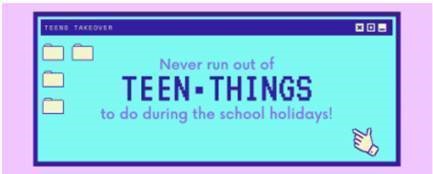
Teens may find navigating the web daunting, especially with many attention-grabbing advertisements and articles. Here’s where Teen•Things comes in – these are librarian-curated bite-sized learning packages on one online space, introducing trending topics such as virtual tours, online escape rooms, and environment sustainability. We hope that this information will serve as inspiration for teens to be creative, challenge themselves and share with friends. A total 12 Teen•Things packages have been produced, with over 3,000 page views. Check them out here
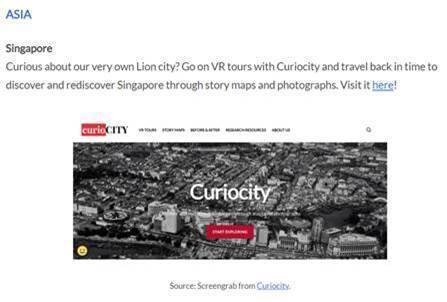
Virtual tours: Can’t travel? No problem! Teens were introduced to virtual travel and digital tours around the globe which they can explore in the comfort of their own homes. See more here
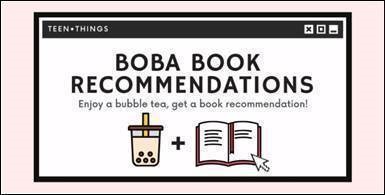
Boba Book Recommendations: Riding on the popular boba drink trend in Singapore, we created a fun quiz where teens were given reading recommendations based on the boba drink of their choice. Check out the quiz here
Teens eBooks
NLB librarians curate the teen digital collection on NLB Overdrive, https://nlb.overdrive.com/ with buzz-worthy themes refreshed throughout the year to spark teens’ curiosity in books they may otherwise not be aware of. Themes include “Among Us” (as per the popular game, the characters in these mystery books seem pretty sus to us) and “Asian #OwnVoices” (diverse reads featuring Asian authors, characters and plotlines).
Virtual hangout spaces: Teen Reading Ambassadors
NLB’s Teen Reading Ambassadors (TRAs) are reading advocates aged 13 to 19. It is a two-year programme where the TRAs are trained by NLB librarians to conduct storytelling sessions, emcee at key NLB events and facilitate literary programmes to share the love and benefits of reading with the community.
Prior to the pandemic, TRA engagements were physical sessions. The evolving situation encouraged librarians to think outside the box and engage TRAs virtually.
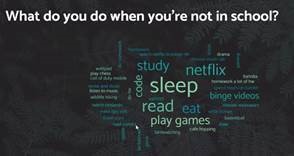
Seeking TRAs’ inputs for evolving needs: TRAs contributed programming ideas and plans during Virtual HangOuts on Zoom and as teen panellists where they provided feedback on ongoing services for teens. These feedback were helpful in providing relevant content for librarians to push out.
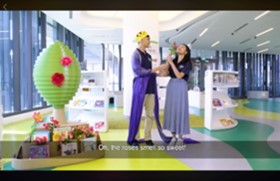
TRAs as reading advocates: TRAs lent their talents to create engaging storytelling videos. These were uploaded on NLB’s Facebook page.
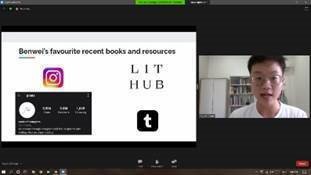
Hosting online events: TRAs participated as panellists, emcees and interviewers for virtual conferences, and hosted workshops for teens, lending their own voices to these programmes.
Teens Takeover workshops
Curated under six identified learning focus areas (digital, sustainability, health, reading, science and career), the Teens Takeover workshops aim to engage teens through their interests while equipping them with skills to navigate life ahead. The sessions are often facilitated by TRAs. Topics include conversational Korean languages as a segue to popular K-pop culture and how to create engaging YouTube videos.
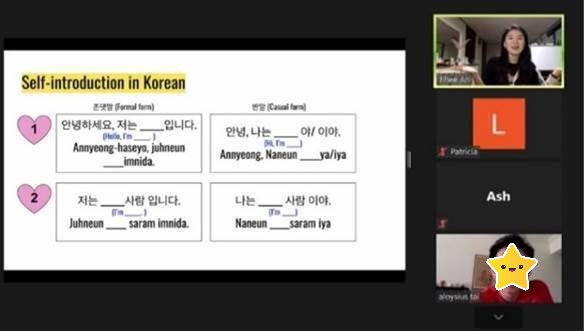
During the pandemic, workshops were conducted live over Zoom as the interaction was more engaging for teens as compared to pre-recorded sessions. Participants could also learn together with other teens – the social aspect being even more important now given the social distancing measures.
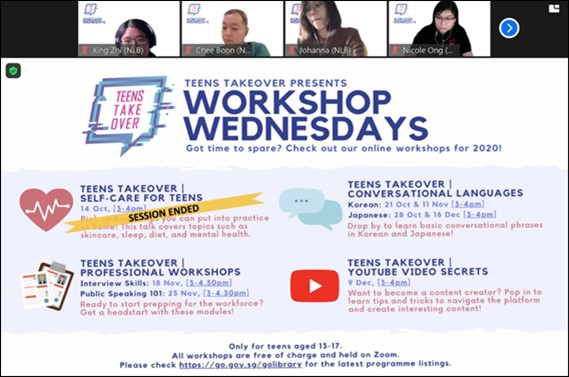
To date, 20 Teens Takeover workshops have been conducted over Zoom, with an average of 15 participants per session. We have received encouraging feedback from our teen participants, such as the below:
“It was fun and I learnt new things on how to create videos for YouTube and Instagram.” (For YouTube Video Secrets)
“The duration of the program was just nice and the person who came to teach us was very patient with our questions. I really learnt a lot.” (For Conversational Japanese)
Moving forward, depending on the Covid-19 situation, we will consider conducting more programmes online instead of physically.
Online giveaways
We came up with social media engagement activities to engage teens and pique their interest in reading. For example, NLB had a collaboration with publisher Scholastic where readers got a chance to win the long-awaited prequel to the Hunger Games trilogy, The Ballad of Songbirds and Snakes.
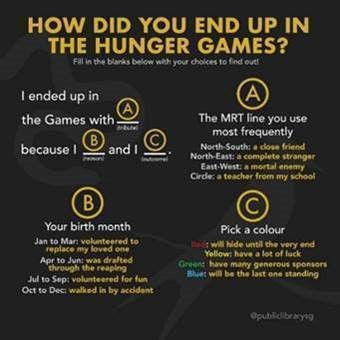
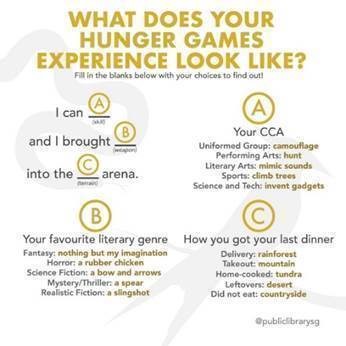
Leveraging online platforms has increased our reach to teens. Due to the evolving trends, we are still learning and finetuning what would attract teens to read more. In addition, we aim to get teens more involved in developing content that would appeal to them. We are hopeful that relevant and quality programme offerings will draw more teens to see the public libraries as ideal physical and virtual spaces for learning beyond school in the new normal.
Technology for teenagers in an Italian library: what changed during Covid-19 emergency?
Interview by Naoko Nakajima Koseki (Chief Planning and Cooperation Division, International Library of Children’s Literature, National Diet Library, Japan) to Nicoletta Gramantieri (Biblioteca Sala Borsa, Bologna, Italy)
Supported by Antonella Lamberti (Children’s Librarian, Biblioteca Comunale Tiziano Terzani, Italy)
Introduction
Naoko Nakajima Koseki visited Bologna in March 2014 and its Sala Borsa Library.
At that time, Nicoletta Gramantieri kindly guided her around the Library. This tour was very impressive for her because there was an independent place for young adults, called “Officina Adolescenti”. There were digital equipment and media to encourage young people to express themselves in the newest way.
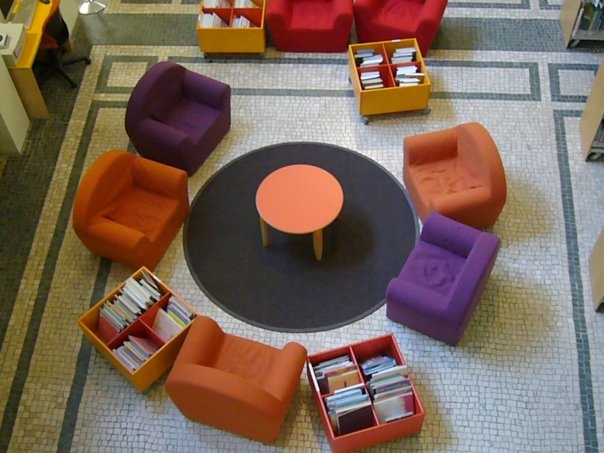
Now, that the libraries services all over the world were pulled to improve their digital offer cause of the pandemic, Naoko is interviewing in late December 2020 Nicoletta Gramantieri about the changes in those activities for teen and YA of Salaborsa in Bologna since 2014.
Q: When did Salaborsa library start to provide digital media for young people?
A: Since its opening in 2001 Salaborsa Ragazzi was defined as a “multimedia library”. Ofcourse its multimedia offer has become wider as the years went by.
At the beginning there was the possibility to use Internet and navigate, then it was added that one of playing video games, using apps selected by librarians both for children and young adults, and there has been coding classes. Since 2012 children have at their disposal a service of digital lending, that offers a free access to a variety of e-books for children, audio books, music and other online contents, to be read or listened to by using PC, tablets, smartphones, e-book readers and other devices.
Q: How have you been teaching the users how to use digital media? Have you ever planned workshops for young people or their guardians?
A: During the years we have especially organized events about coding. We had already planned weekly workshops about coding, robotics, augmented reality to be held in the library as soon as it will be open to the public again.
Last year in the frame of a project of promotion of reading for 0-6 years children, involving libraries, nurseries, preschool and kindergartens, it was realized an educational course to facilitate the creative use of tablets and apps in the education.
The project also consisted in delivering a tablet to each library in town and to each one of the 31 educational services. Last month we also held a supplementary online course about these topics.
Q: I saw a video of Adolescenti on YouTube and I found it very interesting and exciting. Is Adolescenti managed by young people themselves? Or have some adults or specialists been helping or guiding them?
A: “OfficinaAdolescenti” (that means “Teenager’s laboratory”) is a space in Salaborsa Library where two professional educators work with the goal of meeting the cultural needs of children and for realizing together with them cultural projects. The following one is the website for information about OfficinaAdolescenti
In OfficinaAdolescenti there is a room for recording and there are also some posts for video editing that can be booked and used by teenagers.
At the most OfficinaAdolescenti has also a brand for the musical production (OARecords) and several troupes in charge of video making (OAMovie). In that space different kinds of workshops (art, theatre, dance) take place.
Here is the Youtube channel with the music produced by OAR records
Q: What has changed or what is new in those activities nowadays after COVID-19?
A: At present the library is still closed. We only have a loan service working, but the requests for borrowing are operated online. If somebody doesn’t want to come to the library, there’s the possibility to make a request for books delivered at home or as well for using the digital library.
The reference service is made online through video calls to be booked with the librarians by users of any age target: families, children, teenagers. The librarians go around the shelves and in the library rooms with a tablet in the hand that they use for showing books, DVDs, magazines and audio books and they give suggestions. These calls usually end with the list of the requests of books to be borrowed that the user will find available in the library or, better, will have delivered at home.
The activities of OfficinaAdolescenti now take place outside of the library, in spaces dedicated to educational activities that do not have to accomplish to the limitations due to this closure,
The “Reading club” of teens from 11 to 1 years has been moved online, as well as the educational meetings with the volunteers, the teachers and the colleagues from other libraries.
It’s still early to understand how these practices will affect the library, its activities and its services when all the limitations will be over.
Q: Would you please tell me your personal idea about providing digital media for young people referring or comparing to traditional paper book reading?
A: I think that information literacy and access to digital sources are among the goals of the public libraries, and that the libraries should do a sort of “democratic” work for everybody, with the purpose to have everybody able to have access to digital and to develop their skills for using technologies in an active way.
Q: What do you think is useful in using digital media for young people in this hard time under Covid-19?
A: I don’t have any answer for this question. But I think that the answer that the library can give is in its services, that in this period we had to change “re-thinking” them.
The World Through Picture Books 3rd edition – How Does My Country Get Involved?
By Claire Stuckey, Children’s Librarian retired, Central Coast Council – Gosford, Australia
Every country is welcome to submit their top ten picture books based on the criteria developed by the Libraries for Children & YA Section.
To organize a country committee and communicate effectively with our section each country needs a coordinator. This is an important role forming your country’s committee of professional librarians to develop and detail the list.
This role is also a wonderful opportunity for professional development and to form new regional and international networks. Your committee will identify relevant professional organisations, libraries and networks that would assist in contributing titles for the list.
Your committee then collects and reviews these titles to match the criterion to select the most relevant. There is a simple process of submitting the titles online which requires a review of each title in both English and your home language. All publishing details are required. As coordinator it will be a great opportunity to promote your country’s selection after the publication is released.
As the Australian coordinator of the 2nd edition, I was thrilled to once again be representing my country for this international IFLA programme and the 3rd edition. The experience enhanced my professional knowledge, working with a new team outside my workplace and my own region expanded my professional networks leading to further opportunities. The selection process gave our Australian committee a greater understanding of the amazing depth, artistic and educational value of picture books to families and professionals. Please consider representing your country and share this amazing experience.
For Information and Criteria sheets and the Country Coordinators form in several languages please see the WTPB project page.
For any enquires please email:
Claire Stuckey: [email protected] (countries beginning with letter A to J)
Annie Everall: [email protected] (countries beginning with letter K to Z)
The IFLA Guidelines for Library Services to Children age 0-18 in a Nutshell
By Salomon Hellman, Librarian, Stockholms stadsbibliotek, Sweden
In 2018 we released the IFLA Guidelines for Library Services to Children aged 0-18, a completely revised version of the previous Guidelines from 2003. With the Guidelines we provide up-to-date knowledge and professional insight for all of you strategically planning or delivering library services for children and young adults.
We are now taking another step, as we are creating a guidelines poster covering the most essential parts of the main document, together with eye-catching infographics. A QR-code will provide easy access to the complete guidelines. The poster will serve as an introduction to the guidelines for people not yet familiar with them, as well as an everyday reminder for everyone already working with them. We plan to have the poster ready by August 2021, for this year’s WLIC.
On the IFLA Libraries for Children & Young Adults’ Section’s Guideline’s website you find translations of the Guidelines into 14 different languages, and with more to come! If you miss a certain language and want to volunteer to submit a translation, please contact us to make sure no one else is already working on it. We are currently looking for two of the official languages of IFLA, Arabic and French.
Share your thoughts! Have you used the Guidelines at your library or in any other situation? Have they been helpful and inspiring? Do you miss anything? We would love to hear what you think and get examples of how the Guidelines can be used. Please write us a line or two!
Please send your E-Mail to: [email protected]